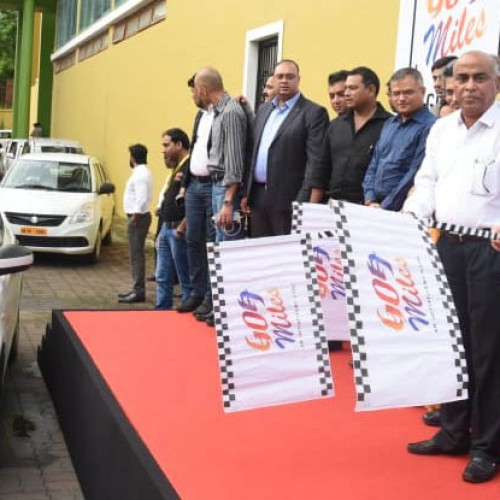TOURISM INDUSTRY’S EXPECTATIONS FROM THE UNION BUDGET 2020
India’s Finance Minister Nirmala Sitharaman will present the union budget 2020 on 1st February. In our pre-budget story, we bring to you India’s travel & tourism industry’s expectations from the upcoming budget. We will keep the story updating until 31 January by adding more inputs from the industry. Watch out this space for further insights and opinions in the run-up to the budget presentation.
Rajesh Magow, Co-Founder and CEO-India, MakeMyTrip: The current slowdown has had an impact on the travel and tourism industry too with overall demand getting impacted. In case of domestic air ticketing the growth rates have come down from teens to single-digit and international air ticketing number have been flat year-on-year. Most hotels chains have also reported much slower growth during the current fiscal.
Tourism, which comes under the service sector in India, is a money-spinner. It offers immense work opportunities, and the backward linkages and multiplier effects extend to manufacturing industries and even agriculture. So the impact that Travel & Tourism growth can have on the economy is immense. To give a fillip to tourism within India – there need to be budgeted funds for developing top tourist destinations. Much as infrastructure-related work may fall under state government’s purview, we should pick 20 key destinations that we want to put on the global tourism map and bring them under a national program/body to promote Tourism. The budget for this national tourism program/body should be carved out from the Union Budget in order to make requisite investments to improve infrastructure. The government should consider giving export industry status to the Tourism Industry.
Tourism is one of the highest export earners in terms of Foreign Exchange which stood at around 29 USD Billion in 2018. Additionally, The government should consider incentivising travel within Indian. With outbound travel figures over 25 million, MICE and Weddings are moving out of India. To tap this segment, we need to motivate people to travel and explore more of India for events.
We have come a long way in linking our cities through world-class airports, excellent highways and a wide network of trains, but last-mile connectivity remains a challenge and there is a lot left to be desired in terms of tourism-specific infrastructure. We need to think of the integrated development of the tourism sector to enable competitiveness and sustain long-term growth. The connectivity between tourist sites or development of tourism circuits needs to be taken up on priority so that one can explore places without accessibility blues.
Mahesh Iyer, Executive Director & Chief Executive Officer, Thomas Cook (India): With the travel and tourism sector contributing significantly to the Indian economy, we believe the Union Budget 2020 should focus on strengthening the tourism sector by continued emphasis on introducing tourism-friendly policies to give impetus to India’s Inbound, Domestic and MICE segments.
Our wish list for the Union Budget 2020 includes:
- Reduction in personal income tax rates and Capital Gains Tax, placing more money in customers hands which will accelerate the growth of travel and other commercial activities
- Lack of quality infrastructure and poor connectivity poses a challenge to domestic tourism, especially in the North East. Creation of new travel circuits in the North East will open a window of opportunity for the tourism sector that is still under-tapped. Concerted efforts from airlines to operate these routes along with lower GST rates on hotels will help boost increased traffic to the region
- Our wish list also includes clarifying the issue of Air Travel Agent being subject to Tax Collection at Source. The amendment of the proviso to section 16(2) in claiming input tax credit on the tax charged by the airline will also help in providing for the specific scenario of payment made by corporates or registered passengers to a travel operator.
Brijesh Modi, Chief Financial Officer, Thomas Cook (India):
The travel and tourism industry is a crucial contributor to the growth of the Indian economy with a powerful multiplier impact on employment generation and we are hence confident that in the Union Budget 2020 the government will strengthen the industry with continuity of its tourism-friendly policies to give a fillip to India’s Inbound, Domestic and MICE segments. India is the 8th largest country in the world in terms of contribution to travel & tourism GDP. The sector generated USD 247.3 billion (INR 16.91 trillion) in 2018, growing 6.7% during the year and accounting for 9.2% of the total economy. The country is the largest market in South Asia and has been the key driver for the growth of the sector in the region. Travel and tourism industry has emerged as the third-largest forex earner for India. At US$28.9 billion, India’s Foreign Exchange Earnings (FEE) for tourism constituted 5.4% of total exports. The sector has been a key source of employment as well, directly accounting for 26.7 million jobs in 2018. By 2029, the sector is expected to provide employment to nearly 53 million people, directly and indirectly. Hence it is important to work on fast-tracking the growth of this sector.
Our wish list from the Union Budget 2020 is as under:
- Newer sectors, travel circuits to be created and encouraged through incentives and promotion. North East of India provides a lot of opportunities for tourism and concerted efforts from airline plus lower GST rates on hotels can help in boosting the tourist arrival there.
- Sustained delivery on the recent initiatives on UDAAN, HRIDAY, PRASAD
- In order to increase the disposable income in the hands of individuals, reduction of personal income tax rates and capital gain tax at the same time wider the taxpayers base
- Give tax benefits around travel to certain sectors like North East, Kashmir and generally on domestic tourism as well as to promote rural, cultural tourism
- Tax benefits for setting up ticketing hub in India – again linked with Make in India
- GST: Compliances and vendor reconciliations need to be simplified and made user-friendly. Speed of implementation of changes to be moderated, Setting up of Knowledge centres for MSMEs for GST compliances and requirements
- Use of carrot approach (preferential treatment, incentives) on compliances and governance in addition to the stick approach
- The aviation industry is an integral part of travel and tourism and we request for a direction and mechanism around airfare monitoring, on the usage of New Engine, on the divestment of Air India
- Rail tourism has great potential and it is a sustainable model of tourism. More faster trains, improved sanitation, cleanliness at various railway stations will help in promoting rail tourism
- The infrastructure required for Cruise tourism needs to be improved, this tourism has a huge potential
- Step up investments and create demand, keeping in mind the fiscal deficit
- Various Export incentives need to continue for the tourism sector
- Core sectors like automobile, telecom, real estate to be fixed as these sectors augur growth of other sectors
- To promote the digital economy, incentives to be given for digital transactions, cashless payments, reducing the limit u/s 269ST of Income-tax Act from Rs 2 Lakhs to Rs 1 Lakh, waiving of MDR charges on digital payments completely
- Clarifying the issue of Air Travel Agent being subject to Tax Collection at Source. The amendment of the proviso to section 16(2) in claiming input tax credit on the tax charged by the airline will also help in providing for the specific scenario of payment made by corporates or registered passengers to a travel operator.
Vishal Suri, Managing Director, SOTC Travel: Indian travel and tourism sector is a significant contributor to the country’s GDP. With an assorted portfolio of niche products like cruises, adventure tourism, heritage/cultural tourism; it is also one of the highest employment generators with experienced and expert professionals. The domestic tourism sector is witnessing a boost post sanctioning of various projects under the Swadesh Darshan & PRASAD and UDAN schemes. With the rise in sustainable tourism propagated by the adoption of electric vehicles/buses, reduction of carbon footprint is also an upcoming and imperative travel trend that is being initiated and forefronted by multiple Indian states. Cruise tourism has also witnessed tremendous growth in India with five operational ports in Mumbai, Kochi, Chennai, Mangalore and Mormugao; with two additional ports being constructed underway in Kolkata and Vizag. To fast-track these projects, it is important to focus on and review multiple travel infrastructure projects in the recently revealed National Infrastructure Pipeline (NIP) to boost connectivity. Reforms such as tax rationalisation and incentivising the private sector would also play a crucial role in the growth of the sector.
Anil Kumar Prasanna, CEO, AxisRooms: For Hospitality Industry there has been a great relief from GST which is still higher compared to the tourism economy countries but it is still a breather from some cuts provided. The B2B business is struggling on GST payments, as most money has to be paid from 20 days of invoice, though some enterprise customers have delayed payment cycles from minimum 30 days extending to 180 days. Hence, technically lot of business are funding through their personal savings, loans to pay the GST and awaiting their invoices to be cleared by customers. It would be great help if this can be deducted more like income tax from the payees especially in B2B segment, where delayed payment cycles are seen, this would ease the cash flow to the economy or some liability policy for the delay in invoice payments for merchants selling services or goods would be a great leverage for the economy. For Travel & Hospitality Industry, we need to take some cue from Thailand as their currency is the most robust compared to all Asian currency for 2019 due to the policy worked upon many years to bring in revenue from tourism and hospitality sector, in fact, it appreciated their local currency by 6% against the USD.
Shwetank Singh, Vice President, Development and Asset Management, InterGlobe Hotels: One of our major demands as an industry continues to be infrastructure status for hotels with a capital expenditure of INR 50 Crores. Since the GST regime has been established, the cost of construction has gone up by 8-10% as the entire civil structure is treated as immovable property. We are hoping to get the option to claim an input tax credit on GST for this. Also, the industry has struggled with variation in bylaws, approvals and licenses, which is why a nodal body is required. This will help us in terms of having a proper time-bound escalation mechanism. With these main areas of standardisation, we are expecting a positive Union Budget 2020 which keeps the tourism agenda at the core of economic growth.
Preety Arora, Head – Business Strategy, Amatra Hotels & Resorts: With the upcoming Union Budget for 2020-21, we are looking forward to various reforms that would enable the industry to grow exponentially. While the government is aggressive across various global markets with the marketing of India as a tourism destination, it is imperative to focus internally and address issues around infrastructure, licensing, approvals and inconsistent regulations that are imposed by various states. We are expecting reforms to be taken around single-window clearance for all operations related to approvals and licensing that makes day to day workings complicated. Further, easing of GST on F&B equivalent to Room category could be a great boost for inviting more guests into the hotels.
We are also hopeful that the government will take cognizance and resolve challenges for the aviation industry which has already seen a tough year in 2019. For one, out of all the stakeholders in the aviation ecosystem, airlines operate with the most paper-thin margins. This, coupled with TCS (Tax collection at source), ends up hampering the working capital of airlines, giving rise to numerous operational difficulties. These obstacles are not only affecting the stakeholders and service providers but the consumers as well. We are optimistic that the government will continue to be open-minded and maintain the impetus of its past initiatives while bringing necessary reformations to further enable the travel sector.
Sunil Gupta, MD & CEO, Avis India (Auto): I believe that the government should build on its recent push towards sustainability by prioritising the growth of the EV ecosystem. This can be done by promoting the creation of a strong and well-connected charging infrastructure on a pan-India level, promoting the setting up of EV battery capacity in the country and incentivizing the adoption of EVs, especially for public transport buses, fleet operator cars and 2 and 3 wheelers. The road connectivity must also be improved between major urban centres and tier-2/3 regions to bolster the growth of the travel and tourism sector.
Varun Chadha, CEO, Tirun (Travel): The government has recognized the potential of cruising as an economic multiplier and is catching up with the world in terms of policies and infrastructure. Cruise Lines are now looking at the government to create a relatable tax regime, which is at par with the rest of the world.
Jasmeet Thind, Co-founder, Coutloot (Ecommerce & Startup): The expectation from the budget is to help the economy recover in most sectors that have seen a smaller growth over the last few years. Apart from this, we hope India lowers its import tax on commodities so that end consumers can have access to aspirational products for cheap prices, while at the same time drive credit subsidies for small business owners and boost manufacturing, which eventually will strengthen the economic growth.
Manish Khera, Founder & CEO, HAPPY (Fintech & Startup): Fund availability has to be made for a conducive and supportive financial environment. This is because the lending fintechs are largely the ones that cater to the people who are not served by the formal financial institutions. The access to liquidity has to be eased for such fintechs. Though there are many funds which are established for the fintechs, the flow of money for the same has its own unique challenges. There has to be a rationalization of MAT tax rate along with the increase in the minimum threshold for tax exemption as many end up paying taxes despite being eligible for the tax holiday.
Yogesh Mudras, MD for Informa Markets in India: The government has recognized the potential of the MICE industry, and we are hopeful that they will take measures to resolve the challenges faced in the sector over the years. We expect the efficient execution of policies as the travel and hospitality sector go hand in hand. While the government leaves no stone unturned to promote India as a tourism destination. It is crucial now to address issues around infrastructure, licensing, approvals, and regulations. The government should promote schemes like UDAN to boost regional connectivity and enable more passengers to travel at affordable rates. Additionally, we should work around the uniformity in taxes applicable on hotel rooms though there has been a great relief from GST, we are still on the high side compared to other countries, a little more reduction will provide considerable relief to both guests and hoteliers.
You might also like
Travel search engine Kayak officially enters Indian market
In India, company has partnered with local online travel providers, airlines and hotels. In India, Kayak has partnered with local online travel service providers, airlines and hotels. The company hopes
Goa CM launches GTDC’s Taxi App ‘Goamiles’
Goa’s first and exclusive mobile app based taxi service GOAMILES has been launched by Hon’ble Chief Minister of Goa, Manohar Parrikar at the Secretariat Complex, Porvorim. Present at the launch were Hon’ble Minister for
Uzbekistan to introduce visa on arrival for UK visitors in April 2017
Uzbekistan is on the verge of a well-justified boost in tourism following the announcement that visa requirements will be relaxed for UK citizens entering the country from April 2017. Rich






